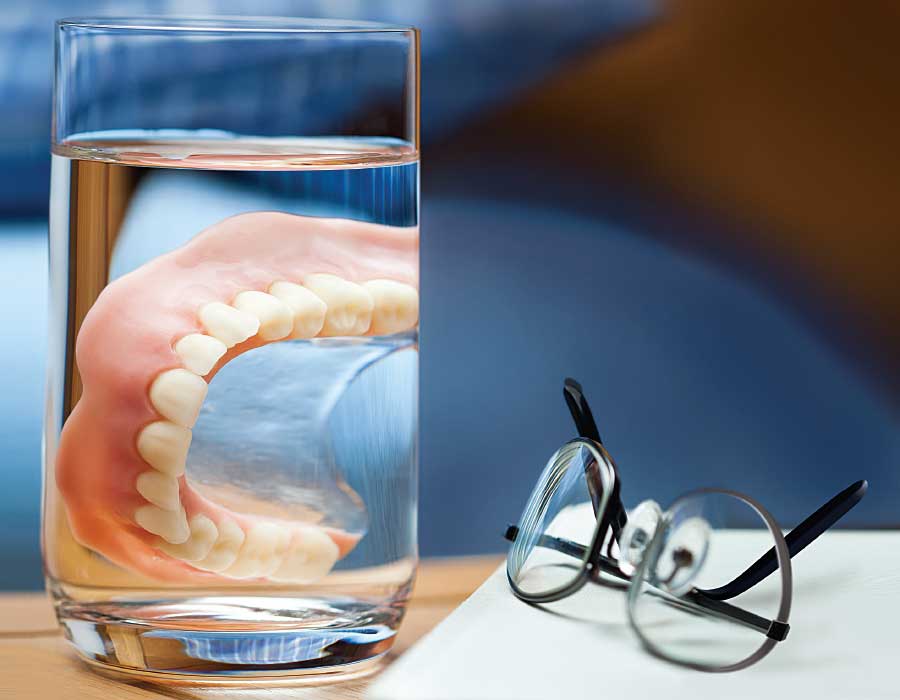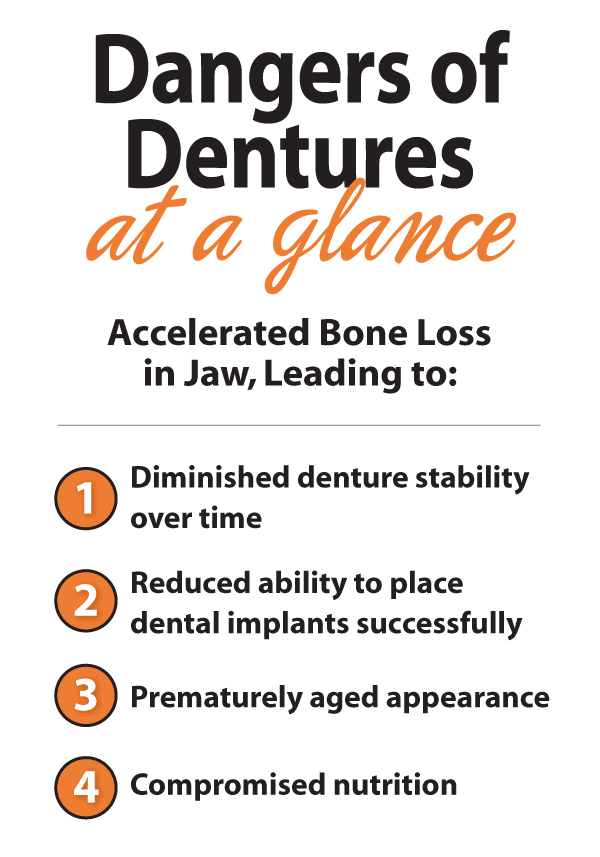The Dangers of Removable Dentures
What you don’t know can hurt you!
 |
Removable dentures are a tooth-replacement method that has certainly been around for a long time. Dentures of gold, porcelain and ivory were routinely fabricated by craftsmen in the 1700s — although by that time, other types had already been in use for centuries. Your great-grandparents may well have worn removable dentures. You might even be wearing them now… and if so, you may already be familiar with some of the problems that have plagued denture wearers throughout time.
The image of false teeth in a glass on the bedside table is a cliché of denture wearing; so are the assortment of cleaners, adhesives, and other products, and the often-heard complaints that dentures just don’t feel right. Slippage or unpleasant odors may cause embarrassment in social situations; the loss of self-confidence that can result from denture wearing, though hard to measure, is a real concern as well. Yet there are other problems that could be of even greater concern — problems that could eventually cause a decline in one’s overall health.
 |
| Dangers of Removable Dentures at a Glance |
Nutritional Problems
It’s well known that people who wear dentures often have trouble eating “challenging” foods, like raw fruits and vegetables — which are just the foods that are thought to provide the greatest nutritional benefits. According to a recent survey, 50 percent of denture wearers avoid many foods due to these types of difficulties. However, the nutritional problems of numerous denture wearers seem to go even deeper: 29 percent said they can eat only soft foods (which are often highly processed, with little nutritional value). Another 17 percent stated that they actually eat better without their dentures. One common reason why people have difficulty eating is that their dentures don’t fit properly. And that brings us to a second trouble spot.
Bone Loss
When teeth are lost, the bone that was supporting them begins to resorb. That’s because bone requires constant stimulation from teeth to keep rebuilding itself. When that stimulation is absent, bone in the jaw loses volume over time — but this loss occurs in an area of the body that’s out of sight, below the gum tissue.
How can you tell that you’re losing bone volume? One sure symptom is that your dentures no longer fit! Once, they conformed to the ridges of bone inside your mouth — but now that some bone has been lost, those ridges have shrunk. The decrease in bone volume not only tends to make you look prematurely aged by compressing the facial features — it may cause TMJ (temporomandibular joint) problems as well.
Worse still, wearing removable dentures can actually result in bone loss. That’s because the denture puts pressure on the surface of the bone, rather than distributing it through the entire anatomical structure. The bone can’t handle this type of pressure on its surface, and begins to resorb at an increased rate.
Dental Implants Offer a Solution
If you need to replace missing teeth but want to avoid the problems of dentures, then dental implants may well be the answer you’re looking for. Implants, today’s optimum method for tooth replacement, have a success rate above 95 percent and can last a lifetime with proper care. But best of all, they feel, fit and function similar to your natural teeth, allowing you to eat what you want; they even prevent bone loss.
Dental implant teeth won’t come loose like dentures. A full arch (upper or lower set) of replacement teeth can be anchored via four to six implants, which become integrated to the bone itself. This means, with implants, you’ll have the confidence to bite into an apple or an ear of corn without wondering if your teeth will slip.
If you’re wearing dentures or need an answer to the dilemma of missing teeth, ask your dentist whether dental implants may be right for you.



